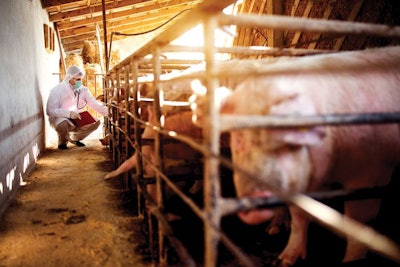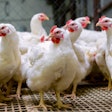
African swine fever (ASF) virus has been detected in 3 more pig herds in South Africa, as well as at a town in the Philippines.
Around mid-December, three new outbreaks of African swine fever (ASF) were confirmed in domestic pigs in South Africa. All the premises are in Gauteng province, reported the agriculture department to the the World Organisation for Animal Health (OIE).
Involving a total of 118 pigs, the outbreaks occurred on a small farm with 40 animals, and among two backyard herds. Approximately 40 of the pigs died, and one was slaughtered.
The latest outbreaks bring the country’s total since April 2019 to 31. Around half of these have been in Gauteng. With one outbreak on a large farm — involving 9,000 pigs in that province during November 2020 — total losses are approaching 15,000. According to the agriculture department, all ASF outbreaks so far have been outside the country’s ASF Control Zone.
South Korea reports further strengthening of disease controls
Over the past week, South Korea’s agriculture ministry has registered with the OIE a further 18 confirmed cases of ASF among the wild boar population.
All of the animals were found in seven counties/regions in the provinces of Gyeonggi and Gangwon between December 31 and January 10. Among the cases are the first for Gapyeong county in Gyeonggi, and Yangyang in Gangwon province.
With the continued spread of ASF among the wild population “at an alarming rate,” the ministry has announced further disease controls. To enable the disease spread to be controlled, Yonhap reports that the density of wild boar is set to be halved. The announcement comes after a recent increase in fence-building and hunting to reduce the movement of the wild population.
According to this source, the number of ASF-infected wild boar in South Korea now stands at 941 since the first case in September 2019.
To keep the infection away from domestic pigs, authorities are urging farmers to disinfect any vehicles entering their properties. No ASF outbreaks have been reported on South Korean farms since October 2020.
Papua New Guinea: Warning against eating pig meat
Authorities in Papua New Guinea are warning people in the Highlands region to stop trading and eating pork, reports Post-Courier.
The National Agriculture Quarantine and Inspection Authority says the cooked meat is “unhealthy.” ASF is not a risk to human health, according to the OIE.
During the holiday period, movements of pigs and pig meat were controlled to stop the spread of ASF, but these measures are to end in the coming weeks. According to the chief veterinarian, ASF has been contained in the Southern Highlands and the provinces of Hela and Enga.
In early March 2020, ASF was detected for the first time in Papua New Guinea, according to OIE data. Since then, four outbreaks have been registered in one region, involving around 400 pigs.
More pigs culled in the Philippines
Approximately 250 pigs have been culled in the province of Albay, reported Inquirer this week. Two animals had tested positive for the ASF virus, according to the mayor of Daraga town. Checkpoints have been put in place around two villages to prevent further spread of the disease. In 2020, at least 480 pigs were culled in the province because of ASF.
Belonging to the Bicol Region, Albay is located in the Luzon Island group.
In order for its pig farmers to thrive, the Philippines needs to improve its standards of risk management and sustainability, according to a senior bank official. She called for an effective biosecurity program that will help producers set up practical measures for disease control, reports Philippine News Agency.
If ASF continues to spread across the country, 750,000 sows could be lost to the disease, according to the national general manager for the Pig Improvement Company. That could lead to 10 years of pork supply shortfalls and high prices in the country, he warned.
View our continuing coverage of the global African swine fever situation.

















